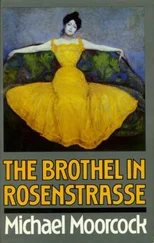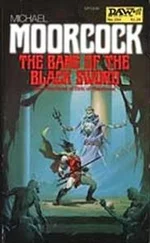Michael Moorcock - Behold the Man
Здесь есть возможность читать онлайн «Michael Moorcock - Behold the Man» весь текст электронной книги совершенно бесплатно (целиком полную версию без сокращений). В некоторых случаях можно слушать аудио, скачать через торрент в формате fb2 и присутствует краткое содержание. Жанр: Фантастика и фэнтези, на английском языке. Описание произведения, (предисловие) а так же отзывы посетителей доступны на портале библиотеки ЛибКат.
- Название:Behold the Man
- Автор:
- Жанр:
- Год:неизвестен
- ISBN:нет данных
- Рейтинг книги:5 / 5. Голосов: 1
-
Избранное:Добавить в избранное
- Отзывы:
-
Ваша оценка:
- 100
- 1
- 2
- 3
- 4
- 5
Behold the Man: краткое содержание, описание и аннотация
Предлагаем к чтению аннотацию, описание, краткое содержание или предисловие (зависит от того, что написал сам автор книги «Behold the Man»). Если вы не нашли необходимую информацию о книге — напишите в комментариях, мы постараемся отыскать её.
Behold the Man — читать онлайн бесплатно полную книгу (весь текст) целиком
Ниже представлен текст книги, разбитый по страницам. Система сохранения места последней прочитанной страницы, позволяет с удобством читать онлайн бесплатно книгу «Behold the Man», без необходимости каждый раз заново искать на чём Вы остановились. Поставьте закладку, и сможете в любой момент перейти на страницу, на которой закончили чтение.
Интервал:
Закладка:
So he spoke in the synagogues and he spoke of a gentler God than most of them had heard of, and where he could remember them, he told them parables.
And gradually the need to justify what he was doing faded and his sense of identity grew increasingly more tenuous and was replaced by a different sense of identity, where he gave greater and greater substance to the role he had chosen. It was an archetypal role. It was a role to appeal to a disciple of Jung. It was a r61e that went beyond a mere imitation. It was a role that he must now play out to the very last grand detail. Karl Glogauer had discovered the reality he had been seeking.
And in the synagogue there was a man, which had a spirit of an unclean devil, and cried out with a loud voice, saying. Let us alone; what have we to do with thee, thou Jesus of Nazareth? art thou come to destroy us? I know thee who thou art; the Holy One of God. And Jesus rebuked him, saying. Hold thy peace, and come out of him. And when the devil had thrown him in the midst, he came out of him, and hurt him not. And they were all amazed, and spake among themselves, saying. What a word is this! for with authority and power he commended the unclean spirits, and they come out. And the fame of him went out into every place of the country round about.
(Luke 4:33-37) "Mass hallucination. Miracles, flying saucers, ghosts, it's all the same," Monica had said.
"Very likely," he had replied. "But why did they see them?"
"Because they wanted to."
"Why did they want to?"
"Because they were afraid."
"You think that's all there is to it?"
"Isn't it enough?" When he left Capernaum for the first time, many more people accompanied him. It had become impractical to stay in the town, for the business of the town had been brought almost to a standstill by the crowds that sought to see him work his simple miracles.
He spoke to them in the spaces beyond the towns. He talked with intelligent, literate men who appeared to have something in common with him. Some of them were the owners of fishing fleets Simon, James and John among them. Another was a doctor, another a civil servant who bad first heard him speak in Capernaum.
"There must be twelve," he said to them one day. "There must be a zodiac." He was not careful in what he said. Many of his ideas were strange. Many of the things he talked about were unfamiliar to them. Some Pharisees thought he blasphemed.
One day he met a man he recognized as an Essene from the colony near Machaerus.
"John would speak with you," said the Essene.
"Is John not dead yet?" he asked the man.
"He is confined at Peraea. I would think Herod is too frightened to kill him. He lets John walk about within the walls and gardens of the palace, lets him speak with his men, but John fears that Herod will find the courage soon to have him stoned or decapitated. He needs your help."
"How can I help him? He is to die. There is no hope for him." The Essene looked uncomprehendingly into the mad eyes of the prophet.
"But, master, there is no one else who can help him."
"I have done all that he wished me to do," said the prophet. "I have healed the sick and preached to the poor."
"I did not know he wished this. Now he needs help, master. You could save his life." The prophet had drawn the Essene away from the crowd.
"His life cannot be saved."
"But if it is not the unrighteous will prosper and the Kingdom of Heaven will not be restored."
"His life cannot be saved."
"Is it God's will?"
"If I am God, then it is God's will." Hopelessly, the Essene turned and began to walk away from the crowd.
John the Baptist would have to die. Glogauer had no wish to change history, only to strengthen it.
He moved on, with his following, through Galilee. He had selected his twelve educated men, and the rest who followed him were still primarily poor people. To them he offered their only hope of fortune. Many were those who had been ready to follow John against the Romans, but now John was imprisoned. Perhaps this man would lead them in revolt, to loot the riches of Jerusalem and Jericho and Caesarea. Tired and hungry, their eyes glazed by the burning sun, they followed the man in the white robe.
They needed to hope and they found reasons for their hope.
They saw him work greater miracles.
Once he preached to them from a boat, as was often his custom, and as he walked back to the shore through the shallows, it seemed to them that he walked over the water.
All through Galilee in the autumn they wandered, hearing from everyone the news of John's beheading. Despair at the Baptist's death turned to renewed hope in this new prophet who had known him.
In Caesarea they were driven from the city by Roman guards used to the wild men with their prophecies who roamed the country.
They were banned from other cities as the prophet's fame grew. Not only the Roman authorities, but the Jewish ones as well seemed unwilling to tolerate the new prophet as they had tolerated John. The political climate was changing.
It became hard to find food. They lived on what they could find, like starved animals.
He taught them how to pretend to eat and take their minds off their hunger.
Karl Glogauer, witch-doctor, psychiatrist, hypnotist, messiah.
Sometimes his conviction in his chosen r61e wavered and those that followed him would be disturbed when he contradicted himself. Often, now, they called him the name they had heard, Jesus the Nazarene. Most of the time he did not stop them from using the name, but at others he became angry and cried a peculiar, guttural name.
"Karl Glogaueri Karl Glogauer!" And they said. Behold, he speaks with the voice of Adonai.
"Call me not by that name!" he would shout, and they would become disturbed and leave him by himself until his anger had subsided.
When the weather changed and the winter came, they went back to Capernaum, which had become a stronghold of his followers.
In Capernaum he waited the winter through, making prophecies.
Many of these prophecies concerned himself and the fate-, of those that followed him.
Then charged he his disciples that they should tell no man that he was Jesus the Christ. From that time forth began Jesus to shew unto his disciples, how that he must go unto Jerusalem,
(Matthew 16:20-21) They were watching television at her flat. Monica was eating an apple. It was between six and seven on a warm Sunday evening. Monica gestured at the screen with her half-eaten apple.
"Look at that nonsense," she said. "You can't honestly tell me it means anything to you." The program was a religious one, about a pop-opera in a Hampstead Church. The opera told the story of the crucifixion.
"Pop-groups in the pulpit," she said. "What a comedown." He didn't reply. The program seemed obscene to him, in an obscure way. He couldn't argue with her.
"God's corpse is really beginning to rot now," she jeered.
"Whew! The stinki"
"Turn it off, then," he said quietly.
"What's the pop-group called? The Maggots?"
"Very funny. I'll turn it off, shall I?"
"No, I want to watch. It's funny."
"Oh, turn it off!"
"Imitation of Christ!" she snorted. "It's a bloody caricature." A Negro singer, who was playing Christ and singing flat to a banal accompaniment, began to drone out lifeless lyrics about the brotherhood of man.
"If he sounded like that, no wonder they nailed him up," said Monica.
He reached forward and switched the picture off.
"I was enjoying it." She spoke with mock disappointment.
"It was a lovely swan-song." Later, she said with a trace of affection that worried him, "You old fogey. What a pity. You could have been John --Wesley or Calvin or someone. You can't be a messiah these days, not in your terms. There's nobody to listen." VI The prophet was living in the house of a man called Simon, though the prophet preferred to call him Peter. Simon was grateful to the prophet because he had cured his wife of a complaint which she had suffered from for some time. It had been a mysterious complaint, but the prophet had cured her almost effortlessly.
Читать дальшеИнтервал:
Закладка:
Похожие книги на «Behold the Man»
Представляем Вашему вниманию похожие книги на «Behold the Man» списком для выбора. Мы отобрали схожую по названию и смыслу литературу в надежде предоставить читателям больше вариантов отыскать новые, интересные, ещё непрочитанные произведения.
Обсуждение, отзывы о книге «Behold the Man» и просто собственные мнения читателей. Оставьте ваши комментарии, напишите, что Вы думаете о произведении, его смысле или главных героях. Укажите что конкретно понравилось, а что нет, и почему Вы так считаете.









